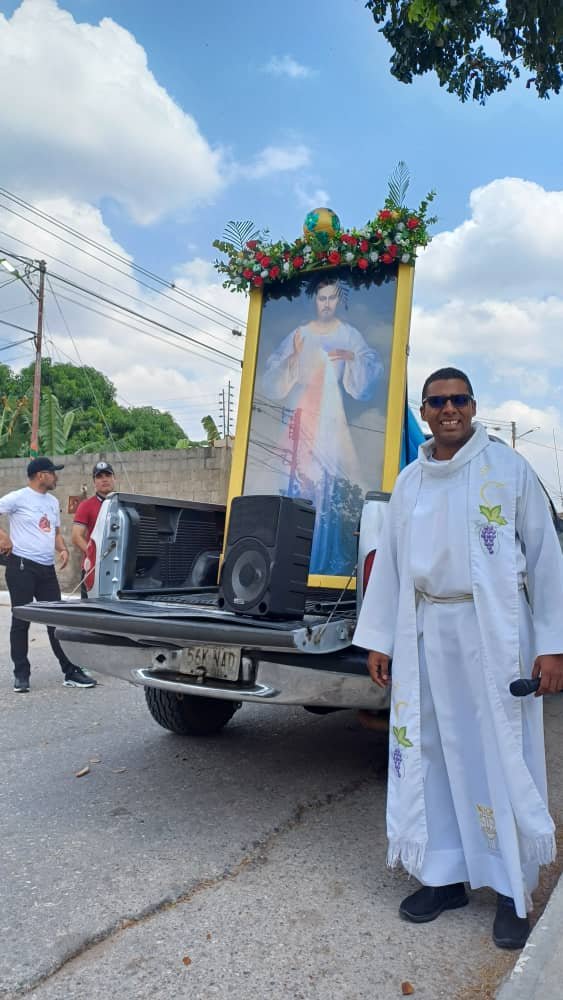VERSIÓN EN ESPAÑOL

Luego de celebrar la Pascua entre los cristianos católicos dedicamos el domingo siguiente la fiesta de la Divina Misericordia, puesto que hay una relación íntima entre la salvación alcanzada por la cruz y resurrección de Jesucristo y la manifestación concreta del amor de Dios, cuyo nombre más apropiado es misericordia, en efecto, entre nosotros éste atributo puede estar o no presente, en cambio en Dios siempre lo podemos encontrar, ya que Él no tiene misericordia sino que ES misericordia, por lo que profesamos que si por un imposible El dejase de ser misericordioso ya no sería Dios.
Experiencia de misericordia
La misma palabra "miseri-cordia" tiene un sentido hermoso, ya que implica un corazón que late en compasión por la miseria que encuentra en su alrededor, no es lo mismo que lástima ya que mientras ésta se queda simplemente en sentimentalismo, la misericordia al poner realmente el corazón, mueve a la acción. Por ello, es la palabra que de mejor manera describe la acción de Dios en medio de la humanidad, ya que Él no es indiferente ante el dolor y las tribulaciones por las que la misma pasa sino que se hace presente en medio de ellas y nos da motivos reales para seguir esperando y apostando por el triunfo del bien.
La misericordia divina es, como escribe Santa Faustina en su diario, la tabla de Salvación para la humanidad, y esto es así porque la cercanía de Dios manifestada en Jesucristo nos asegura que es más grande su amor que el odio, más profundo su consuelo que el dolor, más certera su paz que cualquier tribulación y más eterna y solida su alegría que la tristeza que a veces se apodera de nuestros corazones. Por esto, la imagen de Jesús misericordioso tiene dos rayos, uno rojo y otro más claro, porque su misericordia no es sólo perdón y purificación sino vida y transformación de nuestras existencias hacia todo lo bueno.

La misericordia con nosotros mismos
Para valorar la misericordia de Dios no es suficiente una experiencia espiritual de la misma sino que es necesario que nosotros mismos la internalicemos, es decir, que además de sentirnos perdonados y confiar que la vida siempre nos da una oportunidad, nosotros mismos tenemos que perdonarnos y abrirnos con confianza al futuro, en efecto, la experiencia que he tenido es que cuando no emprendemos un camino personal de sanación y superación interior el avance es más difícil, por no decir imposible.
Para vivir la misericordia es necesario dejar de ser tan duros con nosotros mismos, dejar el perfeccionismo enfermizo que nunca nos deja satisfecho por las cosas que realizamos, y aunque es verdad que siempre podemos hacer mejor las cosas, las equivocaciones y errores no están allí para amargarnos la vida sino para que aprendamos de ellos. Es muy difícil avanzar cuando llevamos a cuestas mucho peso, por eso, hay que liberarnos del pasado que nos atormenta, del sentimiento de culpa que nos hace sentir indignos, esto no es así porque un hecho pasado no determina ni mi presente ni mi futuro, son las acciones de bien que hoy elijo las que conforman mi vida.

La misericordia entre nosotros
La misericordia da sentido a la vida en la tierra, porque nadie es perfecto, por eso, junto con la experiencia de la misericordia de Dios y de nosotros con nosotros mismos también es necesaria la misericordia con los demás, esto es, entre nosotros, ya que la humanidad para progresar no necesita de juicios y señalamientos sino de apoyo y ayuda mutua para no sentir que estamos bregando solos en el mar sino que a pesar de nuestras debilidades e imperfecciones hay otros brazos dispuestos a acompañarnos en nuestras aventuras.
No vale la pena albergar en nuestros corazones sentimientos de odio y rencor con los que hacen el mal, pues sus acciones forman su mismo castigo, porque uno cosecha lo que siembra, además si han elegido el mal es porque están heridos interiormente, pasa como cuando queremos auxiliar a un perro herido y éste nos ataca, ya que su herida no sanada no le permite actuar de otra manera. Así pasa como cuando alguien nos insulta o realiza una mala acción en contra de nosotros, esto habla mal de ellos, no de nosotros. Mantengamos nuestra opción por el bien a pesar de estas cosas y seamos libres para soltar todo mal sentimiento que nos haga perder nuestro enfoque.

ENGLISH VERSION

After celebrating Easter, Catholic Christians dedicate the following Sunday to the feast of Divine Mercy. This is because there is an intimate relationship between the salvation achieved by the cross and resurrection of Jesus Christ and the concrete manifestation of God's love, whose most appropriate name is mercy.
In fact, among us, this attribute may or may not be present, but in God we can always find it, since He does not have mercy but IS mercy. Therefore, we profess that if, by an impossible event, He ceased to be merciful, He would no longer be God.
Experience of mercy
The very word "miseri-cordia" has a beautiful meaning, since it implies a heart that beats in compassion for the misery it finds around it. It is not the same as pity, since while pity simply remains in sentimentality, mercy, by truly putting the heart, moves to action.
Therefore, it is the word that best describes the action of God in the midst of humanity, since He is not indifferent to the pain and tribulations that humanity goes through, but rather He makes Himself present in the midst of them and gives us real reasons to continue hoping and betting on the triumph of good.
Divine mercy is, as Saint Faustina writes in her diary, the plank of Salvation for humanity. This is because the closeness of God manifested in Jesus Christ assures us that His love is greater than hatred, His consolation is deeper than pain, His peace is more certain than any tribulation, and His joy is more eternal and solid than the sadness that sometimes takes hold of our hearts.
For this reason, the image of the Merciful Jesus has two rays, one red and the other lighter, because His mercy is not only forgiveness and purification but also life and transformation of our existence towards all that is good.

Mercy with ourselves
To value God's mercy, it is not enough to have a spiritual experience of it, but it is necessary that we ourselves internalize it. That is to say, that in addition to feeling forgiven and trusting that life always gives us an opportunity, we ourselves have to forgive ourselves and open ourselves with confidence to the future.
In fact, my experience has been that when we do not undertake a personal path of healing and inner improvement, progress is more difficult, if not impossible.
To live mercy, it is necessary to stop being so hard on ourselves, to leave behind the unhealthy perfectionism that never leaves us satisfied with the things we do. Although it is true that we can always do things better, mistakes and errors are not there to embitter our lives but for us to learn from them.
It is very difficult to move forward when we are carrying a lot of weight, so we must free ourselves from the past that torments us, from the feeling of guilt that makes us feel unworthy. This is not so because a past event does not determine either my present or my future. It is the good actions that I choose today that shape my life.

Mercy among us
Mercy gives meaning to life on earth, because no one is perfect. Therefore, along with the experience of God's mercy and of ourselves with ourselves, mercy with others is also necessary. That is, among us, since humanity to progress does not need judgments and accusations but support and mutual help so as not to feel that we are struggling alone in the sea but that despite our weaknesses and imperfections there are other arms willing to accompany us in our adventures.
It is not worth harboring feelings of hatred and resentment in our hearts towards those who do evil, because their actions form their own punishment, because one reaps what one sows. Furthermore, if they have chosen evil, it is because they are wounded inside. It is like when we want to help a wounded dog and it attacks us, since its unhealed wound does not allow it to act otherwise.
The same happens when someone insults us or performs a bad action against us. This speaks badly of them, not of us. Let us keep our option for good despite these things and be free to let go of any bad feeling that makes us lose our focus.



Posted Using InLeo Alpha

Interesante definición de la misericordia. Para recibir misericordia primero debemos darla. Saludos